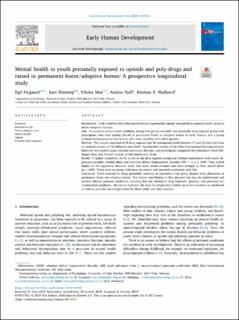Mental health in youth prenatally exposed to opioids and poly-drugs and raised in permanent foster/adoptive homes: A prospective longitudinal study
Peer reviewed, Journal article
Published version
Permanent lenke
https://hdl.handle.net/11250/2987715Utgivelsesdato
2019Metadata
Vis full innførselSamlinger
Originalversjon
Early Human Development. 2019, 140 . https://doi.org/10.1016/j.earlhumdev.2019.104910Sammendrag
Abstract Background Little is known about the mental health of prenatally opioid- and polydrug-exposed youth raised in foster/adoptive families. Aim To compare mental health problems among two groups of youth, one prenatally drug-exposed group with participants who were mainly placed in permanent foster or adoptive homes in early infancy and a group without known prenatal risk factors who were raised by their birth parents. Methods The sample consisted of 45 drug-exposed and 48 nonexposed youth between 17 and 22 years old from an original sample of 136 followed since birth. An extended version of the Mini International Neuropsychiatric Interview was used to assess lifetime psychiatric disorder, and participants completed the Achenbach Adult Self-Report form and Cantril's Ladder of Life Satisfaction Scale. Results A higher proportion of the youth in the drug-exposed group had lifetime experiences with major depressive episodes, alcohol abuse and attention deficit, hyperactivity disorder (OR > 3, p ≤ .030). They scored higher on the aggressive behavior scale, had more sexual partners and were younger at their sexual debut (p ≤ .030). There were no group differences in current self-reported satisfaction with life. Conclusion Youth exposed to drugs prenatally continue to represent a risk group despite early placement in permanent foster and adoptive homes. The factors contributing to this elevated risk may be multifaceted and involve adverse prenatal conditions including but not limited to drug exposure, genetics, and postnatal environmental conditions. The results highlight the need for longitudinal follow-up in the transition to adulthood as well as qualified service provision for these youth and their families.
